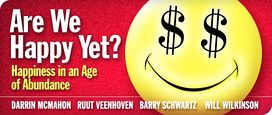At the end of my initial reply to Darrin, I mentioned that I wanted to say something about why so many people think we’re unhappy, even though the evidence says we’re not. Here’s a partial crack at that question. (I give a related but different diagnosis at the end of my paper.)
One obvious reason for our willingness to believe in widespread malaise is the proliferation of books, movies, articles, and other media that tell us how horrible things are these days. Part of the story has to be that bad news sells better than good news. “If it bleeds, it leads,” as they say. University of California, Davis psychologist Michael Hagerty suggests that this is one reason most Americans think that their life has improved, while most other Americans’ lives haven’t.
I also think that Darrin is right that we worry in part because we can — because we are already doing well enough to lounge around contemplating if we’re really, truly, authentically happy. An article in today’s Onion satirizing the documentary aspirations of NPR’s “This American Life” helps bring home the essential triviality of educated, urban Americans’ narcissistic obsession with our own minor neuroses.
“We’ve done it,” said senior producer Julie Snyder, who was personally interviewed for a 2003 This American Life episode, “Going Eclectic,” in which she described what it’s like to be a bilingual member of the ACLU trained in kite-making by a Japanese stepfather. “There is not a single existential crisis or self-congratulatory epiphany that has been or could be experienced by a left-leaning agnostic that we have not exhaustively documented and grouped by theme.”
The article is spiced with a sidebar that lists “Topics Covered by the Project,” including:
- Coffee Addiction: One Woman’s Tale of Survival
- Miniature Golf and Its Discontents
- Help! I’m a Lincoln-oholic
And, my favorite:
- Waiting for Godot… Or at Any Rate, My Orthodontist Appointment
Good fun! We should be grateful indeed that so many Americans have it so good that we find the time to worry about whether our cats are making us schizophrenic. I doubt it’s much different in other wealthy countries.
Nevertheless, it is true that the pace of economic and technological progress has become very, very fast — faster than it has ever been in human history. The speed of cultural adaptation is also fast, but maybe not fast enough. Many of us need a ready-made conception of life to make sense of our place in the world, but cultural frames that organize and give meaning to our rapidly and radically changing world are often out of date as soon as they are made ready. Furthermore, just as young humans have a period of easy language acquisition, after which it becomes hard to pick up additional languages, and almost impossible to do so without some kind of accent, it seems plausible that we have a similar period of cultural receptivity during which we swiftly acclimate to our society’s distinctive norms and practices. But if technological and cultural change moves fast enough, then the social world to which our cultural capacity has been calibrated may be long gone by the time we reach midlife, leaving us feeling like aliens – leaving us with the cultural equivalent of embarrassingly thick accents – in our own homes.
While I think these kinds of concerns are worth taking seriously, I don’t think they are serious enough to warrant seriously second-guessing the pace of growth and change. However anxious or discomfited progress has made some of us, these worries just don’t seem to show up in the survey data on average subjective well-being, as Ruut shows. That doesn’t settle the question, of course. St. Louis University philosopher Dan Haybron – in my opinion the most incisive critic of happiness survey methods – suggests [pdf] that the seemingly flat trends in average happiness may be papering over real increases in stress and anxiety. I share Haybron’s concerns about happiness surveys, but suspect that the various biases in the reporting of subjective states he lays out cut in the opposite direction: surveys more likely understate gains in real subjective well-being.
But even if Haybron is right, it remains that the benefits of economic growth and technological advance for the objective conditions of human life are simply overwhelming. We’d need very clear evidence of extremely serious problems with our psychological well-being to be justified in seriously considering a concerted slowdown. And we cannot morally neglect the fact that global economic growth — fueled by global trade — is now pulling many of the world’s poorest societies up the part of the development curve where additional income indisputably has a very large positive effect on happiness. It would be gallingly parochial for wealthy, healthy, massively privileged people to demand policies that could damage the hope of happiness for billions simply in order to ease our mild cultural vertigo, periodic bouts of consumer anxiety, and coffee addictions.
Of course, massively privileged people are people, too. But what we need is not a world with less change and less choice. What we need is a better grip on how best to build good lives in our constantly morphing world and a better grasp of what such lives mean. Books like Barry’s The Paradox of Choice contain plenty of great advice on how to sweat less in the face of abundance, and the second half of Layard’s Happiness is full of sound counsel on strategies for increasing satisfaction with life. What we need more of is that: good self-help. And we need a lot more good art, literature, and film by people who understand that the world is not in fact going to hell.

